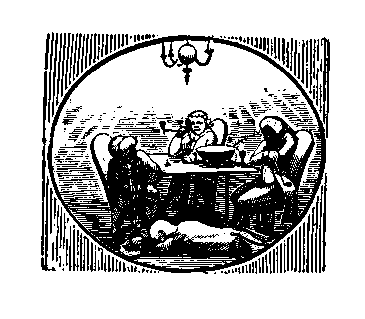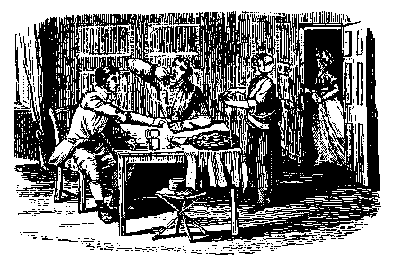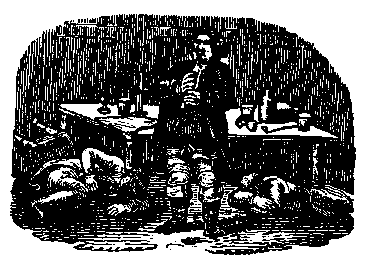'n'
Prigs
Carlos Amantea

Thus I have brought with me Tom Jones, Vanity Fair, The Way of All Flesh, Moby-Dick, three novels of Faulkner, and The Life of Samuel Johnson by James Boswell.
It is the latter that entertains most consistently and well. The contrast between the precisely detailed life in 18th century urban (and urbane) England and the scattered life of 20th century rural Mexico certainly adds a pith to them both.
Boswell and Johnson were bookish conversationalists --- something given to intellectuals in England during the Age of Enlightenment. They were endlessly needling each other --- with their exotic English, their profound knowledge of the classics, their wit. The Life of Samuel Johnson is not merely the biography of a lone genius; rather, it is a drama, an extended play --- a word-play between two eccentrics who cannot leave off going at each other.
Boswell, the Scotsman, at odds with his father, too much away from his wife, a pursuer of the great, a man who must have spent all his waking hours either writing in his notebook, or verbally wrestling with the writer of Rasselas, The Rambler, and the Dictionary of the English Language. Johnson himself --- a huge, cranky, immensely erudite maven of the language, constantly twitting and being twitted by his friend of twenty-one years.
Boswell may have loved the man for whom he was amanuensis --- but he could never resist describing with a surgeon's fine cut some of the grotesqueries of his eccentric friend:
-
It is requisite to mention that while talking or even musing as he sat in his chair, he commonly held his head to one side towards his right shoulder, and shook it in a tremulous manner, moving his body backwards and forwards, and rubbing his left knee in the same direction, with the palm of his hand. In the intervals of articulating he made various sounds with his mouth, sometimes as if ruminating, or what is called chewing the cud, sometimes giving half a whistle, sometimes making his tongue play backwards from the roof of his mouth, as if clucking like a hen, and sometimes protruding it against his upper gums in front, as if pronouncing quickly under his breath, too, too, too; all this accompanied sometimes with a thoughtful look, but more frequently with a smile.
Generally when he had concluded a period, in the course of a dispute, by which time he was a good deal exhausted by violence and vociferation, he used to blow out his breath like a whale.
This is the man that Boswell admits to loving too tenderly --- but their snits were legion, and in their lifetimes they could go for a year or two without seeing each other. Like lovers, they would profess their affection, but always, one would have uneasy feelings about the other, some of which grew from their virulently opposed views on women and virtue, and Americans, the Scots, and Whigs:
Like lovers, they would profess their affection, but always, one would have uneasy feelings about the other, some of which grew from their virulently opposed views on women and virtue, and Americans, the Scots, and Whigs:
Johnson: Mason's a Whig.
Mrs. Knowles: (not hearing him distinctly): What! a Prig, Sir?
Johnson: Worse, Madam; a Whig! But he is both.
Often the tension between Johnson and Boswell arose from their insatiable desire to hector each other --- calling each other, "Sir" all the while. This is their conversation, shortly after Johnson completed his monumental Dictionary of the English Language, which he assembled single-handedly, with its 40,000 definitions, and 114,000 quotes, drawn from every field of learning and literature --- a project which cost him nine years of labor, all of which was well known to his interrogator: He was the supreme savant of the English language, the master of its history, its roots, and its beauty. His intellectual reasoning was superb; his emotional distancing was made possible by the language he spoke and wrote and thought. A show of human feelings was a weakness to be scorned and mocked. This was the same Johnson, however, who at the end of his life could write, with such complete, innundating misery:
Boswell:
It may be of use, Sir, to have a Dictionary to ascertain the pronunciation.
Johnson: Why, Sir, my Dictionary shows you the accent of words, if you can but remember them.
Boswell: But, Sir, we want marks to ascertain the pronunciation of the vowels. Sheridan, I believe, has finished such a work.
Intermixed with these sharp and ironic exchanges would be sudden descriptions of Johnson's all-too-appealing human characteristics:
I never shall forget the indulgence with which he treated Hodge, his cat; for whom he himselr used to go out and buy oysters, lest the servants having that trouble, should take a dislike to the poor creature.
 Johnson was a melancholic (he said "Life is a progress from want to want, not from enjoyment to enjoyment.") He may have seen his peers, his history, and his language with the profundity of unquestioned genius, but he was, at the same time, a lonely, profoundly sad semi-alcoholic, one who was deeply fearful of madness, sickness, and death.
Johnson was a melancholic (he said "Life is a progress from want to want, not from enjoyment to enjoyment.") He may have seen his peers, his history, and his language with the profundity of unquestioned genius, but he was, at the same time, a lonely, profoundly sad semi-alcoholic, one who was deeply fearful of madness, sickness, and death.
Oh! my friend, the approach of death is very dreadful. I am afraid to think on that which I know I cannot avoid. It is vain to look round and round for that help which cannot be had. Yet we hope and hope, and fancy that he who has lived to-day may live tomorrow.
©1994, Mho & Mho Works